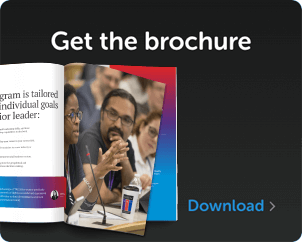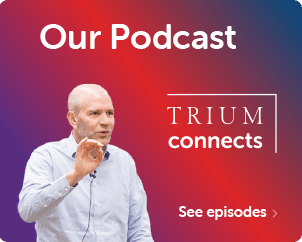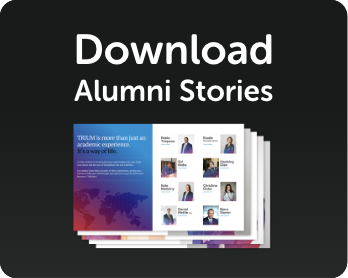
Looking back at 20 years of TRIUM with Matt Mulford

Dr Matt Mulford, TRIUM’s first Academic Dean, shares personal memories from the inaugural TRIUM Class of 2003, and considers how the original vision remains as relevant as ever for challenges the world faces today.
How would you describe the vision for the TRIUM programme when it was first launched in 2001?
The founders started with trying to define what it was that our students needed – now and for their futures. We thought of our target market in broadly three categories:
1 – Those who were at the top of a functional role (i.e. CFO, CMO,…ect.) who needed to deeper understanding of other functions to take on an enterprise leadership role;
2 – Those who had founded a business as entrepreneurs who did not have a business degree but who desired the improvements which would come from a deeper understanding of (or validation of) all the things they were already doing;
3 – People currently working in firms who desired to gain the skills and network to change their lives’ trajectories with a new job or enterprise.
For all three groups we needed to provide, at an executive level, all the core elements one would find in an MBA degree. This was and is the foundation of any effective executive MBA.
But, in addition to these more narrowly defined learning objectives, the founders believed that to be a successful business leader in an era of globalisation, one needed to have the tools to understand the social and political environment in which business operated. We set out to have this element be both our unique selling point and the fil rouge which would run throughout the programme.
So, for example, if you wanted to understand finance as a global leader, you had to understand the political and social role that the finance industry plays in different countries. You need to know how the financial regulatory environment is shaped by the politics of national and supra-national entities? You need to know how capital and trade flows affect and are affected by domestic and international politics?
All the founders believed that the combined strengths of the three Partner Schools put us in a uniquely powerful position to address these ‘meta-issues’ and prepare our students for global leadership positions. The design of the program – both pedagogically and physically – reflected this fundamental belief.
We also, if I am honest, had a bit of an evangelical streak in our thinking. There was – and I think still is – a belief that by helping to create and nurture cross-national, cross-cultural relationships we would be part of the fight against narrow nationalism, prejudice, and ignorance. Put simply, we believed that if you put a bunch of successful and powerful people in a room together, from places all over the world, and have them learn, live and work together on a joint project, we would contribute to further global understanding and integration. I know that this can sound a bit grandiose, but it would be untrue to say that it was not an important spirit from the very start of TRIUM.
Is that same vision still relevant today in your view?
Without a doubt! If anything, the themes are even more relevant and self-evident today.
Over the past twenty years, how has TRIUM delivered on this vision?
It has been the success which we hoped for. At its best, TRIUM is more than just a degree. Rather, it is a programme which nurtures a transformation in worldview. If we do our jobs right, TRIUM is a programme which opens mindsets and changes behaviours. To the credit of an amazing team of people, I think we have delivered on this promise.
As you still teach on TRIUM and co-direct the Capstone Projects, is there any difference that you see in the TRIUM students or cohorts now vs. then?
There are more commonalities than differences. The students are still seeking something in addition to what they now have. We have to remember that by any measure our students are already successful. Yet, they are, if not necessarily dissatisfied with their current condition, looking for something which will provide them an opportunity for more – more understanding, a more global network, and a broader and deeper understanding of the world. That base characteristic remains unchanged.
That said, I would say the biggest differences I see was between pre and post-ranking cohorts. Before TRIUM was ranked, the students were real pioneers. They had the prestige of the three Partner Schools behind the degree, but unlike a degree from a single school, the TRIUM EBMA had no ranking and thus our early students could not be driven by the chance to acquire a top ranked degree. I do not want to give the impression that post-ranking students are only or primarily motivated by the prestige which came with the rankings. I still think they are driven primarily by the chance to learn. However, choosing a degree with top ranking and great learning content is a different decision than going with an unknown, unranked degree because you liked the look of it.
What is one of your strongest [best] personal memories of that first module and then leading the Class of 2003 through the inaugural programme to graduation?
The strongest personal memory I have of the first module is how the students reacted to the terrorist attacks of September 11. I was teaching when news started coming in of the hijacked planes flying into the World Trade Center. There were a lot of students in the cohort who either lived in New York or had friends and relatives there. The students decided that they wanted the teaching programme to continue because there was nothing they could do about what was happening anyway. While we took many more breaks and did whatever we could to keep people informed, it was clear to me that this group was unlike others I had taught. They were resilient and focussed. I think we all struggled to concentrate during these sessions (on Game Theory!) but it did keep our minds from dwelling on the horror of what was happening. It also created a really strong cohort effect. This was only further enhanced when we arrive in New York in January, 2002 for Module 2.
More generally, my best memories of the programme all revolve around the friends I have made through the years – both students and colleagues. My life has been enriched by knowing so many special people. In the early years, a special thank you has to go to Erin O’Brien – TRIUM’s first Executive Director. We worked together as Dean and Executive Director through the first years of the programme. I can, with hand on heart, say that TRIUM would not exist as it does today without Erin’s dedication and skill. I learned so much from her! I also fondly remember working with Shona Macfarlane. She and I made up the entire LSE-based team and her skill in her job and capacity for work was another early key to success. Finally, I remember being inspired by George Blanc from HEC and Ray Richardson from LSE and Ken Froewiss from NYU Stern – the first three Academic Directors and the real architects of the original pedagogy. Finally, Catherine Manthorpe (LSE), Rosemary Mathewson (NYU) and Bertrand Moingeon (HEC) were key to TRIUM’s early success and acceptance within each of the respective Schools and helped me greatly in my own professional development. I could name so many more but, to be brief (or at least not as long as I could be!), it is the people I remember most and who continue to be the most important!






